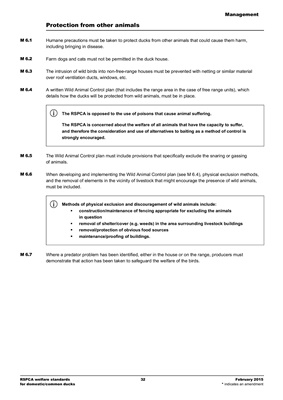
Management
RSPCA welfare standards
for domestic/common ducks
32 February 2015
* indicates an amendment
Protection from other animals
M 6.1 Humane precautions must be taken to protect ducks from other animals that could cause them harm,
including bringing in disease.
M 6.2 Farm dogs and cats must not be permitted in the duck house.
M 6.3 The intrusion of wild birds into non-free-range houses must be prevented with netting or similar material
over roof ventilation ducts, windows, etc.
M 6.4 A written Wild Animal Control plan (that includes the range area in the case of free range units), which
details how the ducks will be protected from wild animals, must be in place.
The RSPCA is opposed to the use of poisons that cause animal suffering.
The RSPCA is concerned about the welfare of all animals that have the capacity to suffer,
and therefore the consideration and use of alternatives to baiting as a method of control is
strongly encouraged.
M 6.5 The Wild Animal Control plan must include provisions that specifically exclude the snaring or gassing
of animals.
M 6.6 When developing and implementing the Wild Animal Control plan (see M 6.4), physical exclusion methods,
and the removal of elements in the vicinity of livestock that might encourage the presence of wild animals,
must be included.
Methods of physical exclusion and discouragement of wild animals include:
construction/maintenance of fencing appropriate for excluding the animals
in question
removal of shelter/cover (e.g. weeds) in the area surrounding livestock buildings
removal/protection of obvious food sources
maintenance/proofing of buildings.
M 6.7 Where a predator problem has been identified, either in the house or on the range, producers must
demonstrate that action has been taken to safeguard the welfare of the birds.